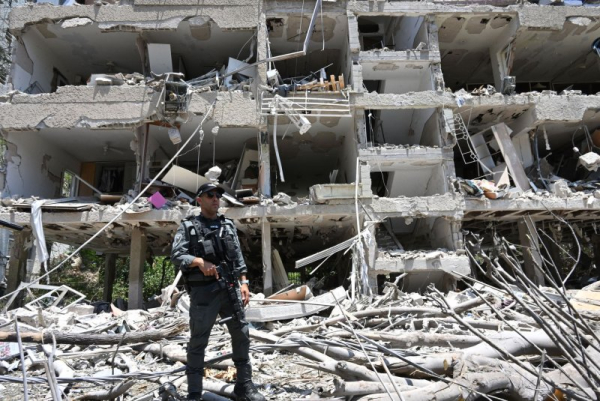

1 of 3 | Israeli security stands in front of a residential building hit by an Iranian ballistic missile in Tel Aviv early Sunday morning, June 22, 2025. Iran launched two waves of missiles at Israel following the American bombing of its nuclear sites. Photo by Debbie Hill/ UPI | License Photo
Iran and Israel exchanged targeted airstrikes Sunday after President Donald Trump ordered the bombing of nuclear sites in Iran, leaving his administration and lawmakers divided over U.S. involvement.
“We’re not at war with Iran. We’re at war with Iran’s nuclear program,” Vice President JD Vance said in an interview with NBC News’ “Meet the Press” on Sunday. It marked the first major official rhetoric that the United States is indeed “at war.”
Vance declined to confirm that Iran’s nuclear sites were completely destroyed, saying that the U.S. has “substantially delayed” Iran’s ability to develop a nuclear weapon. His comments come after Russia said Sunday that other countries could provide Iran with nuclear weapons.
The United Nations Security Council held an emergency summit meeting Sunday in Dubai, where Iran’s U.N. ambassador, Amit Saeid Irvani, said that the United States “decided to destroy diplomacy,” and that his country’s military would decide the “timing, nature and scale” of Iran’s “proportionate response.”
Ali Akbar Velayati, an adviser to Iran’s supreme leader, any U.S. ally that attacks Iran “will be a legitimate target for our armed forces,” according to the state-run IRNA news agency.
The Trump administration has expressed interest in restarting diplomatic talks with Iran. “Let’s meet directly,” Secretary of State Marco Rubio said in a CBS interview. Defense Secretary Pete Hegseth said the United States “does not seek war.”
But Iranian officials said the time for negotiations had passed and that Iran had a right to defend itself.
The strike by the Trump administration has divided his supporters. Rep. Marjorie Taylor Greene, R-Ga., for example, criticized what she called “neocon warmongers” in a post on social media Sunday afternoon.
“America is $37 TRILLION in debt and all of these foreign wars have cost Americans TRILLIONS AND TRILLIONS of dollars that never benefited any American,” the lawmaker wrote in her post.
“American troops have been killed and forever torn apart physically and mentally for regime change, foreign wars, and for military-industrial base profits. I’m sick of it. I can easily say I support nuclear-armed Israel’s right to defend themselves and also say at the same time I don’t want to fight or fund nuclear armed Israel’s wars.”
Rep. Thomas Massie, another Republican, went as far to call the strike on Iran “not Constitutional” in his own post. He later criticized fellow Republican House Speaker Mike Johnson for stating that Trump “made the right call” with the airstrike.
“Why didn’t you call us back from vacation to vote on military action if there was a serious threat to our country?” Massie said in his remarks to Johnson. He reiterated that point Sunday in an interview with CBS News’ “Face the Nation.”
Massie was joined on “Face the Nation” by fellow lawmaker Rep. Ro Khanna, a Democrat, with whom he worked last week to introduce a war powers resolution to prohibit U.S. forces from striking Iran without authorization from Congress.
Khanna said in the interview that Secretary of State Marco Rubio expressed a desire for Iran to enrich uranium for peaceful purposes but the lawmaker noted that Iran had already been under a nuclear deal that the United States withdrew from.
According to Khanna, under the Joint Comprehensive Plan of Action, or JCPOA, which was negotiated by Iran, the United States and the European Union in 2015, the International Atomic Energy Agency did not find a single violation.
“In the first Iraq war, the second Iraq war and the war in Afghanistan, Congress first got the briefings. Congress met and debated. It should have been declarations of war, but at least they did an authorization of use of military force,” Massie added. “We haven’t had that.”
The Israeli Defense Forces said in a statement Sunday that the Israeli Air Force used 30 fighter jets to attack dozens of military targets across Iran.
“As part of the wave of attacks, fighter jets first attacked the ‘Imam Hussein’ strategic missile headquarters in the Yazd region, where long-range Khoramshahr missiles were stored,” the IDF said. “From this headquarters, approximately 60 missiles were launched towards the State of Israel.”
The IDF added that it also hit missile launchers and military sites for the production of air defense batteries, and a drone warehouse in Isfahan, Bushehr and Ahvaz.
Air raid sirens sounded across most of Israel on Sunday as Israeli Police acknowledged impacts from Iranian missiles on Sunday, including a strike in Tel Aviv that left at least six people with minor injuries, while videos shared on social media purportedly showed damage in Haifa.
Meanwhile, Iranian state media reported Sunday that the Houthis — formally known as Ansarullah — expressed support for Iran after the U.S. strikes and would “stand by any Arab or Islamic country against U.S. aggression.”